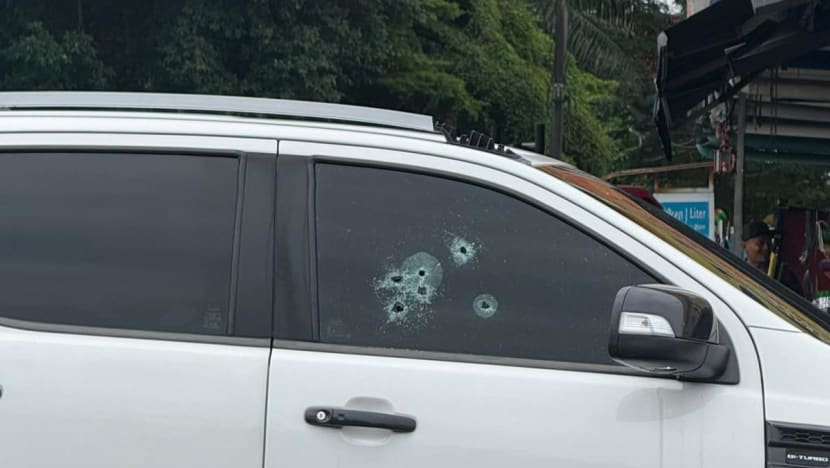Commentary: Organised crime and gun violence are a vicious cycle in Malaysia
A string of deadly shootings has sparked debate about whether gun violence is a growing concern in Malaysia, says RSIS’ Rueben Dass.

Photos circulating online of the Jun 20 fatal shooting in the town of Meru in Malaysia's Selangor state appear to show six bullet holes in the driver’s side window. (Photo: Facebook/Info Buletin Semasa)

This audio is generated by an AI tool.
SINGAPORE: Malaysia recently reported at least six shootings that left six people dead over a period of three weeks. Three of the six incidents occurred in Klang Valley and others were reported in the states of Perak, Penang and Johor.
The incidents exhibited similar characteristics – masked assailants shooting at their targets and making a swift escape on motorcycles or cars.
While not new, incidents like these are relatively uncommon in the country. However, the string of cases within such a short period of time has sparked debate about whether Malaysia is experiencing a growing gun problem.
LINKS WITH ORGANISED CRIME
Kuala Lumpur police noted that the capital remains safe as the two shootings in Brickfields and Cheras were linked to organised crime, and likely unrelated to each other.
Most of the crime networks in Malaysia operate as smaller groups similar to secret societies, rather than larger triads. These gangs often deal in drugs, extortion and other illegal businesses.
Organised crime remains a major problem in urbanised areas such as Kuala Lumpur, Penang, Perak and Johor. Lack of economic opportunities, inequality and unemployment have been among the main factors in those areas.
Impressionable and marginalised youth are a prime target for organised crime networks. Johor police in 2023 said that secret societies were recruiting students at secondary schools, while KL police said that gangs use influencers to reach out to teens on social media platforms.
ILLEGAL TRAFFICKING ROUTES
Illegal firearms are crucial to organised crime networks for self-protection, and to threaten or assassinate rivals. They are seldom used against law enforcement unlike in other countries like the US.
Private manufacturing of firearms is not common in Malaysia and most of the illegal firearms are sourced from neighbouring countries such as Thailand. Small arms and ammunition enter Thailand from Cambodia and are distributed from Phuket, Bangkok and Chiang Mai.
Several high-profile cases in Malaysia hint at the involvement of Thai-made weapons. In February, Israeli national Shalom Avitan was sentenced to prison for possession of firearms and ammunition that were allegedly sourced from Thailand.
A shooting at the Kuala Lumpur International Airport in 2024 involved a firearm that was believed to have been sourced from a neighbouring country.
Malaysia’s northern border regions with Thailand are prime areas for illegal trafficking and smuggling. Border towns such as Sungai Golok, Pasir Mas and Padang Besar are key entry points for illegal weapons and drugs.
For example, the border town of Sungai Golok between Kelantan and Narathiwat is separated by a river which is only several metres wide. In the dry season, smuggling activity increases as the river dries up and border crossings can be done by foot. Cracking down on crime is a big challenge for authorities due to porosity and in some areas, heavily forested terrain.
Illegal firearms are much cheaper in Thailand, ranging from 2,000 to 8,000 ringgit (US$470 to US$1,900), and can be re-sold for double the price in Malaysia. Popular models are the Glock, Sig Sauer and 0.38 calibre handguns. Revolvers, while dated, are still in demand for its utility and cheap prices. Many of these firearms are smuggled via land routes either whole or in parts and assembled later.
There is also a possibility that modified imitation firearms from Thailand, like the gun used in the 2023 Siam Paragon mall shooting, are being smuggled into Malaysia.
Sources have noted that lorries carrying pigs and trash cans in buses have been used to smuggle illegal firearms and evade detection. Many of these guns are also increasingly available on the dark web.
LOOKING FORWARD
In Malaysia, the illegal manufacture, discharge and trafficking of firearms are capital offences.
With strict legislation already in place, other measures need to be taken to mitigate the issue of gun-related crime, in particular smuggling.
Strict border control is key in this regard. It is commendable that Kelantan authorities have taken steps to increase border patrolling and security in smuggling hotspots.
In the long term, authorities should consider more permanent control measures such as perimeter fencing to reduce the porosity of the borders. They can also incorporate the use of technology such as specialised scanners and drone surveillance to enhance monitoring. Corruption among border officers is another urgent matter that must be addressed.
Organised crime and gun violence form a vicious cycle. Thus, ending gun violence would necessitate stamping out organised crime. Intelligence-led operations and community-based engagement are crucial in this respect.
More importantly, the government must address the systemic and foundational root causes that drive crime namely poverty, unemployment and lack of education.
Developments in technology such as 3D-printing must also be monitored closely. 3D-printing is increasingly used to privately manufacture firearms. It has become a security concern in Europe and North America.
3D-printed firearms have been used by the anti-junta forces in the conflict in Myanmar. More recently, a 3D-printed handgun was discovered in a raid on a house in Lampung, Indonesia. It may be a matter of time before it becomes a worrying trend across Southeast Asia.
Thus, law enforcement must be equipped with the skills to manage issues such as 3D-printing, the dark web and cryptocurrencies, which are being employed by criminals in the firearm black market. It is imperative that the authorities stay ahead of the curve and always be one step ahead of the criminals.
Rueben Dass is Associate Research Fellow with the International Centre for Political Violence and Terrorism Research, at the S Rajaratnam School of International Studies (RSIS).













